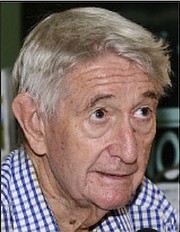Richard Coulson bemoans the lack of progress in re-developing the downtown area of the Bahamian capital city.
I have just finished last year’s fascinating book, ‘Power at Ground Zero’ by Lynette B Sagalyn, about the rebuilding in downtown Manhattan after the horrendous 9/11 terrorist attack that killed nearly 3,000 people and destroyed the two 110-storey World Trade Center buildings, whose collapse blighted an entire city neighbourhood.
Although we have never suffered a similar catastrophe, we nevertheless live with our own urban Ground Zero, the zombie zone of derelict structures, vacant storefronts and empty lots that dominate eastern Bay Street, turning what should be a vibrant mixed-use district into a wasteland shunned equally by tourists and natives - and, incidentally, losing millions of potential tax revenues.
The origin of this wasteland was not an abrupt act of willful violence but a planned government policy. The decision to remove commercial shipping from downtown Nassau was a rational move to improve traffic and raise property values by shifting away from docks and warehouses to higher value uses - in short, to create an entirely new environment.
The problem was, and remains, that only the first half of the policy was ever carried out. Shipping was moved to Arawak Cay by the decisions of then Prime Minister Hubert Ingraham, where our container port was built and successfully operates as a public-private partnership. But the new Progressive Liberal Party (PLP) administration took no interest in the second half: replacing the huge gaps, both physical and economic, left by the departed shipping industry. Prime Minister Perry Christie’s many words of enthusiasm for change have, as often, been followed by no action.
In New York, within a few days of the traumatic shock of September 11, 2001, the public and private sectors were already committed to rebuilding. Newly-elected Mayor Bloomberg soon detailed the abrupt economic impact on New York and decreed essential budget cuts and layoffs of city employees - can one imagine Mr Christie ever taking such decisive action?
In the following years, Ms Sagalyn’s book describes how the city and state governments came together with the bi-state NY-NJ Port Authority to obtain federal “Liberty Bond” financing from Washington and secure commitments from a stubborn private real-estate investor, to rebuild not only office buildings but a transportation hub and a memorial for the dead. As she tells in 900-page detail, the process was long and painful, with many bitter personal and political conflicts to negotiate between the players, until today much of the work is completed, with cost over-runs accepted as a cost of the final result.
The underlying message of her book is that the public sector had to become intimately engaged and take the leadership. Even with our infinitely smaller problem, nothing like this has happened in our capital city. One cannot point to a single government initiative to improve downtown from Rawson Square east to Armstrong Street. Several years ago, the Chinese owners of the British Colonial Hotel spoke of their proposal to re-develop the area: dead silence from government since then.
The private owners of prime waterfront property just east of Prince George Dock provided a detailed plan to restore fire-ravaged vacant lots with their own financial resources: no response from government, presumably because the developers were not PLP cronies. Our government does not even have the commercial savvy to develop its own assets: the out-dated publications building, with dock and parking lot, occupies space that could accommodate a variety of profitable ventures.
Even worse, government has actually taken a step to block development. It permitted the key 3.9-acre Union Wharf property to be sold to a Barbados company with no requirements of use. As long as this parcel is allowed to sit vacant behind locked gates, it will stymie any improvement of the adjacent area. The owner company has, as its Bahamian director, Eric Gibson, known to be Peter Nygard’s property manager and brother of Minister of Labour Shane Gibson; perhaps this ownership structure discourages any rational sales, joint-venture or leasing programmes.
Surveying this scene, Minister of Tourism Obie Wilchcombe can only utter his constant laments that our touristic offerings need change and revival, reinforced by cruise ship owners’ frequent complaints about downtown’s uninspiring attractions.Unfortunately, little is likely to change during the remaining two months (at least) of Mr Christie’s government of inertia.
• Comments and responses to insight@tribunemedia.net






Comments
Use the comment form below to begin a discussion about this content.
Sign in to comment
OpenID